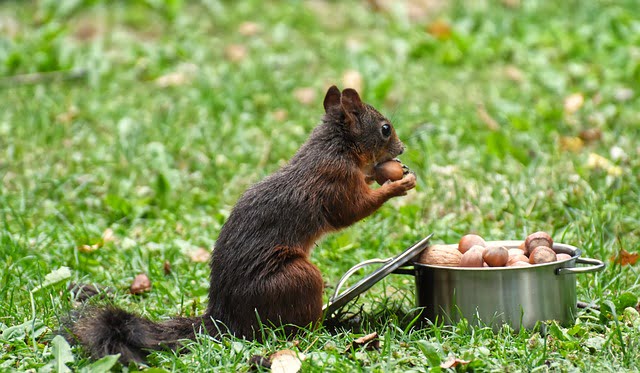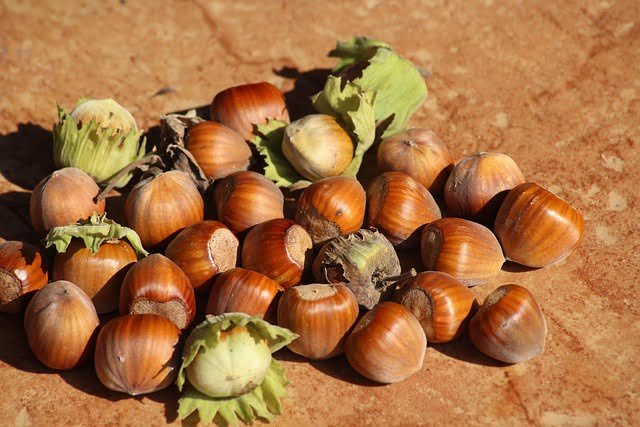As a nature enthusiast, you may have wondered, can squirrels eat hazelnuts? The answer is a resounding yes! Squirrels love to snack on hazelnuts, and these nuts provide essential nutrients for their health and well-being. In this comprehensive guide, we will delve into the world of squirrels and their dietary preferences, focusing on the consumption of hazelnuts. We will discuss the nutritional benefits of hazelnuts, which species of squirrels eat them, how to properly store and prepare hazelnuts for your furry friends, and potential hazards associated with feeding hazelnuts to squirrels. So let’s get started!
Table of Contents
Nutritional Benefits of Hazelnuts for Squirrels
Hazelnuts are a rich source of nutrition for squirrels, providing essential nutrients such as carbohydrates, proteins, fats, and potassium. These nutrients help squirrels maintain their energy levels and support their growth and development. Let’s take a closer look at the nutritional value of hazelnuts:

Calories and Macronutrients
Per 100 grams (approximately 3 ounces) of raw, unroasted hazelnuts, you can expect to find:
- 630 calories
- Fat: 61g
- Protein: 15g
- Carbohydrates: 17g
Potassium Content
Hazelnuts are also an excellent source of potassium, with 680mg per 100 grams. Potassium is an essential nutrient for squirrels, as it helps maintain proper muscle function and overall health.
Which Species of Squirrels Eat Hazelnuts?
Different species of squirrels have varying dietary preferences, and the consumption of hazelnuts is no exception. Some of the most common squirrel species that enjoy hazelnuts include:
Eastern Gray Squirrels
Eastern gray squirrels are known for their diverse diet, which includes berries, seeds, nuts, fruits, buds, bark, and fungi. Hazelnuts are a favorite snack for these squirrels, providing them with essential calories to survive, especially during the winter months when other food sources may be scarce.
Fox Squirrels
Fox squirrels also enjoy hazelnuts as part of their diet. These squirrels are part of the Sciuridae family, which includes numerous breeds found throughout the world. Their diet primarily consists of scavenging in bushes or trees for available produce, such as acorns, maple samaras (seeds), sunflower seeds, and, of course, hazelnuts.
How to Properly Store and Prepare Hazelnuts for Squirrels
If you want to provide hazelnuts to squirrels, it’s essential to ensure that the nuts are stored and prepared correctly. This will help maintain the nuts’ freshness, nutritional value, and overall safety for the squirrels.
Storing Hazelnuts
To store hazelnuts effectively, follow these tips:
- Choose the freshest, least processed hazelnuts possible. Avoid pre-shelled or packaged nuts, as these may contain chemicals or preservatives.
- Keep hazelnuts away from direct sunlight to prevent spoilage.
- Store them in an airtight container or resealable plastic zip bag in a cool, dark place, such as the refrigerator or freezer.
Preparing Hazelnuts
Before feeding hazelnuts to squirrels, it’s important to prepare them properly. Here are some suggestions on how to do so:
- Roast the hazelnuts on low heat in a single layer on a baking sheet until they are fragrant. Allow them to cool completely before serving.
- Alternatively, blanch the hazelnuts by soaking them overnight in water and then roast them.
Potential Hazards Associated with Feeding Hazelnuts to Squirrels
While hazelnuts can be a healthy and enjoyable snack for squirrels, there are some potential hazards to be aware of when feeding these nuts to your furry friends. These hazards include:
Choking Hazards
Squirrels can choke on large pieces of hazelnuts, so it’s essential to break the nuts into smaller pieces before feeding them to squirrels.
Contamination Risks
Improperly stored or handled hazelnuts can become contaminated with toxins and bacteria, posing a risk to squirrels. To minimize this risk, ensure that you store and prepare the hazelnuts correctly, as previously discussed.
Allergic Reactions
Some squirrels may be allergic to the high protein content in hazelnuts. If you notice any signs of an allergic reaction in a squirrel after feeding them hazelnuts, it’s important to consult a veterinarian for guidance.
Tips for Selecting the Right Nuts for Your Pet Squirrel’s Diet
If you have a pet squirrel and want to incorporate hazelnuts into their diet, it’s essential to select the right type of nuts. Here are some key considerations when choosing the best hazelnuts for your pet squirrel:
- Nutritional quality: Look for hazelnuts that are high in nutritional value, with minimal added sugars or other unhealthy additives.
- Size and texture: Choose hazelnuts that are appropriately sized and textured for your squirrel’s preferences and ability to digest.
- Variety: Wild hazelnuts may contain fewer fats than cultivated types, so consider providing a mix of both types to ensure a balanced diet for your pet squirrel.
How to Ensure Nut Freshness When Storing and Preparing Hazelnuts for Your Pet Squirrel’s Diet
To maintain the freshness and nutritional value of hazelnuts for your pet squirrel, follow these guidelines:
- Store the hazelnuts in an airtight container in a cool, dark place away from direct sunlight.
- Dry roast the hazelnuts before serving to enhance their nutritional value and flavor.
- Inspect each nut for signs of mold or spoilage before feeding them to your squirrel.
Hazelnut Alternatives for Squirrels
If you’re looking for additional nut options to provide squirrels, consider these alternatives, which also offer essential nutrients and health benefits:
- Acorns: Rich in fats and carbohydrates, acorns are a popular choice for many squirrel species.
- Walnuts: High in omega-3 fatty acids, walnuts can help support healthy brain function in squirrels.
- Pecans: Pecans provide a good source of protein and healthy fats for squirrels, making them a great addition to their diet.
Observing Squirrel Behavior While Feeding Hazelnuts
When feeding hazelnuts to squirrels, it’s essential to observe their behavior to ensure they are enjoying the nuts and not experiencing any adverse effects. Watch for:
- Chewing patterns: Ensure the squirrel is chewing the hazelnuts effectively to minimize the risk of choking.
- Signs of enjoyment: Look for indications that the squirrel is enjoying the hazelnuts, such as enthusiastic eating or returning for more.
- Allergic reactions: Monitor the squirrel for any signs of an allergic reaction, such as swelling or difficulty breathing, and consult a veterinarian if necessary.

Conclusion
In conclusion, the answer to the question, “Can squirrels eat hazelnuts?” is a resounding yes! Hazelnuts provide essential nutrients for squirrels, making them an ideal snack for these woodland creatures. By properly storing and preparing hazelnuts and being aware of potential hazards, you can safely provide these tasty treats to your backyard squirrels or pet squirrel. So go ahead and share the love of hazelnuts with your furry friends!





